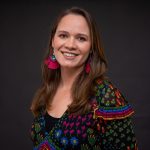Contributed by Charles R. Venator Santiago
 El Instituto is also happy to welcome Professor Salvador Vidal-Ortiz, who has a senior joint appointment with the Department of Sociology. Professor Vidal-Ortiz will be joining us during the Fall of 2025. Dr. Vidal-Ortiz’s scholarship cuts across racialization, sexuality, gender, migration, and religion; his work is interdisciplinary. He co-edited two award-winning books: The Sexuality of Migration, and Queer Brown Voices, co-authored a book with two former students, Brandon Andrew Robinson and Cristina Khan, titled Race and Sexuality, and is completing a book manuscript about race, gender, and sexuality in Santería (an Afro-Cuban religious-cultural practice).
El Instituto is also happy to welcome Professor Salvador Vidal-Ortiz, who has a senior joint appointment with the Department of Sociology. Professor Vidal-Ortiz will be joining us during the Fall of 2025. Dr. Vidal-Ortiz’s scholarship cuts across racialization, sexuality, gender, migration, and religion; his work is interdisciplinary. He co-edited two award-winning books: The Sexuality of Migration, and Queer Brown Voices, co-authored a book with two former students, Brandon Andrew Robinson and Cristina Khan, titled Race and Sexuality, and is completing a book manuscript about race, gender, and sexuality in Santería (an Afro-Cuban religious-cultural practice).
Within the American Sociological Association (ASA), he was elected Chair of the Latina/o Sociology section; in the past, he has served as convener (and first non-elected Chair) of the Sociology of the Body and Embodiment section, is Past Chair of the Sexualities Section, and served as inaugural editorial board member for Sociology of Race and Ethnicity, from the Race and Ethnic Minorities section (where he was a Council member as well). In 2018, he served as tri-chair for ASA’s Sexualities Section Pre-conference: Sexualities, Race, and Empire: Resistance in an Uncertain Time. Outside of the discipline, he was an inaugural editorial board member for TSQ: Transgender Studies Quarterly; he also coedited a special issue of GLQ: Gay and Lesbian Studies Quarterly, on CuirAméricas as part of the Feminist and Cuir/Queer Américas Working Group. In DC, he has supported community-based groups such as Different Avenues -see related essay on Public Sociology– and the Latino GLBT History Project.
He continues Fulbright-based research on displacement and LGBT people in Bogotá, Colombia. With Juliana Martínez, he edited Travar el Saber: Educación de Personas Trans y Travestis en la Argentina (loosely translated as Trans-ing knowledge: trans* people’s education in Argentina) – based on narratives from students and teachers that show the challenges and opportunities of trans-inclusion in three public education sites in the greater Buenos Aires province. He has taught sociology of race and ethnicity at the University of Colorado – Boulder; in Colombia, a qualitative research methods course for the graduate social sciences program at Universidad de Los Andes; one on migration, gender, and sexuality for the Masters in cultural studies at Universidad Javeriana, also in Colombia; and in Brazil, a course on race, gender and sexuality inclusion in education for the Masters in Education at Universidade Federal Do Amapá.
He has received a few important honors and fellowships recently: In the Fall of 2019, he held a Distinguished Scholar in Residence position in the Gender, Sexuality, and Women’s Studies Program at the College of the Holy Cross; for the Spring of 2022, he was the Stephen O. Murray Inaugural Scholar in Residence at Michigan State University; and during AY 2023-24, he was a Distinguished Visiting Scholar at University at Buffalo.
We would also like to welcome Professor Ana-Michelle McSorley, who teaches in the Department of Allied Health Sciences. Anna-Michelle completed  her two-year postdoctoral position at New York University (NYU) School of Global Public Health in the Department of Public Health Policy and Management and the Center for Anti-racism, Social Justice, and Public Health. She received her PhD (2022) and MPH (2018) in Community Health Sciences from the University of California, Los Angeles (UCLA) Fielding School of Public Health. As part of her graduate training, she completed a minor in Race, Ethnicity, and Politics within the Department of Political Science at UCLA. As a funded Policy Fellow with the UCLA Public Health Training Program on Population Health Advocacy, she gained community-based policy advocacy expertise. Her research focuses on health inequities among Latino/a/e groups and identifies opportunities for solidarity across populations that experience similar structures of exclusion and injustice that contribute to health and healthcare inequities. At UConn Waterbury, she seeks to build upon her Latino/a/e population health research agenda and work to meet the needs of the expanding Latina/o/e communities in Connecticut – now representing nearly 1/5 of the state’s population. For more information on Professor McSorley, please visit her sites: https://alliedhealth.uconn.edu/person/anna-michelle-mcsorley-phd/ and https://www.amcsorley.com/
her two-year postdoctoral position at New York University (NYU) School of Global Public Health in the Department of Public Health Policy and Management and the Center for Anti-racism, Social Justice, and Public Health. She received her PhD (2022) and MPH (2018) in Community Health Sciences from the University of California, Los Angeles (UCLA) Fielding School of Public Health. As part of her graduate training, she completed a minor in Race, Ethnicity, and Politics within the Department of Political Science at UCLA. As a funded Policy Fellow with the UCLA Public Health Training Program on Population Health Advocacy, she gained community-based policy advocacy expertise. Her research focuses on health inequities among Latino/a/e groups and identifies opportunities for solidarity across populations that experience similar structures of exclusion and injustice that contribute to health and healthcare inequities. At UConn Waterbury, she seeks to build upon her Latino/a/e population health research agenda and work to meet the needs of the expanding Latina/o/e communities in Connecticut – now representing nearly 1/5 of the state’s population. For more information on Professor McSorley, please visit her sites: https://alliedhealth.uconn.edu/person/anna-michelle-mcsorley-phd/ and https://www.amcsorley.com/